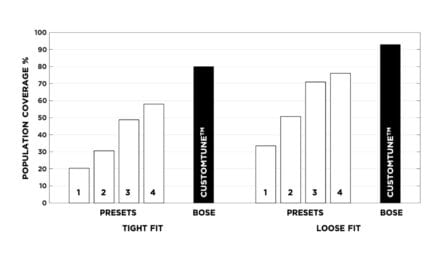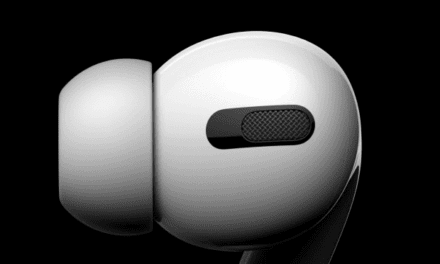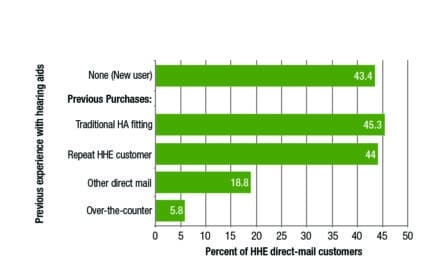When hearing care is normalized, the stigma will recede, which could inspire many to take a first step toward wearing hearing aids.
By Shari Eberts
Are those AirPods in your ears, or are they hearing aids? Soon, the answer could be both! A watershed moment for people with hearing loss as hearing devices, for the first time, move into the mainstream. The form factor alone is a game changer. This hearing aid is not the beige-colored plastic variety hiding unobtrusively behind long hair but a large white mass unapologetically protruding from one’s ear.
Part fashion statement, part communication clout, AirPods roared onto the technology scene in 2016, changing the way we talk on the phone and listen to music. Will they now alter the landscape for hearing care, squashing the stigmas surrounding using hearing devices that have held firm for decades? If so, these devices could finally make hearing care more palatable to the large, underserved group of people with mild-to-moderate hearing loss.
AirPods Pro Hearing Aids Could Have Saved Me Years of Struggle
Flashback 30 years to my first semester at Harvard Business School. The class discussion was rapid-fire. Points were raised, counterpoints offered, and jokes and asides became more commonplace as time went on. It was during a case study about the marketing failure of New Coke that I first realized I couldn’t hear as well as my classmates.
The room exploded in laughter, leaving me bewildered and wondering what I had missed. “What did she say?” I whispered to my seatmate for the third time that day. He was getting tired of answering me. And I was getting tired of asking. What was happening?
My father’s hearing had begun to fade as a young adult. So had his mother’s. I was terrified remembering him sitting alone at family parties, isolating himself in fear that others might discover he was having trouble hearing. The stigma he felt pushed him farther away from friends and family with each passing year. Would that soon be me?
Despite my fear, I went to get my hearing tested. I knew that I needed help hearing in class, but when the audiologist said there was nothing they could do for my then mild hearing loss, I was thrilled! It was the perfect excuse to deny my hearing loss for many years. Good news for my stigma-shrouded heart but bad news for my listening fatigue.
It wasn’t until my hearing loss progressed to the point where I could no longer function at work that I purchased a pair of hearing aids, wearing them hidden behind my long hair so nobody could see them. Letting go of the stigma took longer. But when I saw my children watching me struggle with my hearing loss like I had watched my father do, I knew it was time to break the cycle. Only then did I finally embrace my hearing loss and turn to advocacy.
Will the Industry Embrace AirPods Pro 2 Devices?
If AirPods Pro had been available for me at the early stages of my hearing loss journey, would I have used them? The answer is probably yes. Or at least I would have given them a try. AirPods Pro are specifically made for people with perceived mild-to-moderate hearing loss, and because they look like what everyone else already has in their ears, they provide an easy bridge to wearing hearing devices for those (like me at the time) who are reluctant to step into a more traditional hearing aid.
But would the first audiologist I saw have recommended them? I hope so. The best audiologists meet their clients where they are, and if that is in a place where low-cost, low-stigma devices are the only ones they will adopt, so be it.
Further Reading
The Beginning of the End of Hearing Loss Stigma
OTC hearing aids have been available directly to consumers without a prescription since October 2022, and the consumer pick-up has been mixed. But the AirPods Pro could be different. No other over-the-counter hearing aids have benefited from a pre-installed user base. With a mere software download, compatible AirPods—devices people already use regularly and with great success—turn into something more: hearing aids.
When hearing care is normalized like this, stigma will fade. And everyone in the industry, consumers and practitioners alike, will benefit.
About the Author: Shari Eberts is a passionate hearing health advocate and internationally recognized author and speaker. She is the founder of Living with Hearing Loss, a popular blog for people with hearing loss, and an executive producer of We Hear You, an award-winning documentary about the hearing loss experience. Her award-winning book, Hear & Beyond: Live Skillfully with Hearing Loss, (co-authored with Gael Hannan) is the ultimate survival guide to living well with hearing loss. Eberts has an adult-onset genetic hearing loss and hopes that by sharing her story, she will help others to live more peacefully with their own hearing issues.
Photo: Dreamstime






Thank you Shari on a much-needed article on hearing loss stigma, and how OTC hearing aids are moving towards ending it.
Would appreciate more on OTC hearing aids:
The price of current day hearing aids, specially if the hearing loss is profound (why should it be so) can run in the thousands. The perception then is that hearing aids that cost a few hundred dollars cannot provide the hearing boost needed.
An investigation into their ability to address hearing loss with all the associated features.
Do they work also for profound hearing loss, or only for mild to moderate loss?
Thank you,
Anjali Amit